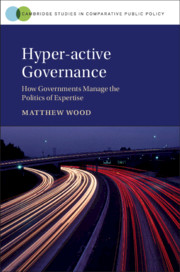Book contents
- Hyper-active Governance
- Cambridge Studies in Comparative Public Policy
- Hyper-active Governance
- Copyright page
- Contents
- Figures
- Tables
- Boxes
- Preface
- Acknowledgements
- Abbreviations
- Part I Introducing Hyper-active Governance
- 1 The ‘Cult of the Expert’
- 2 Managing the ‘Expert–Politics Nexus’
- Part II Hyper-active Governance in Practice
- Part III Theorising Hyper-active Governance
- Book part
- Notes
- References
- Index
1 - The ‘Cult of the Expert’
from Part I - Introducing Hyper-active Governance
Published online by Cambridge University Press: 21 June 2019
- Hyper-active Governance
- Cambridge Studies in Comparative Public Policy
- Hyper-active Governance
- Copyright page
- Contents
- Figures
- Tables
- Boxes
- Preface
- Acknowledgements
- Abbreviations
- Part I Introducing Hyper-active Governance
- 1 The ‘Cult of the Expert’
- 2 Managing the ‘Expert–Politics Nexus’
- Part II Hyper-active Governance in Practice
- Part III Theorising Hyper-active Governance
- Book part
- Notes
- References
- Index
Summary
In October 2016, The Guardian published a story about what it called ‘The Cult of the Expert’, which had dominated the first decade of the twenty-first century (Mallaby, 2016). Following the global financial crisis, the chair of the US Federal Bank, Ben Bernanke, was asked by a congressional committee whether he had $85 billion to inject into the economy. ‘I have $800 billion’, he replied. ‘Somehow’, the Guardian noted, ‘America’s famous apparatus of democratic checks and balances did not apply to the monetary priesthood. Their authority derived from technocratic virtuosity’. Scholars have noted since the 1990s how political issues have tended to be put in the hands of so-called experts; scientists, lawyers, clinicians, economists and the like (Fischer, 1990; Barker and Peters, 1993; Hoppe, 1999; Maasen and Weingart, 2006). As political scientist Alasdair Roberts argued in his evocative 2011 book The Logic of Discipline, ‘the pervading sense was that liberal democracies lacked the capacity to make hard choices and that mechanisms were necessary to force those choices or empower technocrat-guardians who would make them on society’s behalf’ (Roberts, 2011, p. 144). Following the fall of the Soviet Union and the rise of Francis Fukuyama’s famously flawed ‘End of History’ thesis, ‘by the turn of the 21st century, a new elite consensus had emerged: democracy had to be managed’ (Mallaby, 2016).
- Type
- Chapter
- Information
- Hyper-active GovernanceHow Governments Manage the Politics of Expertise, pp. 3 - 35Publisher: Cambridge University PressPrint publication year: 2019



